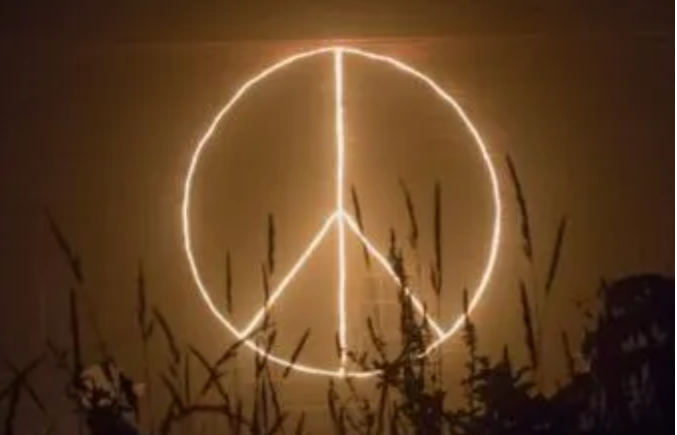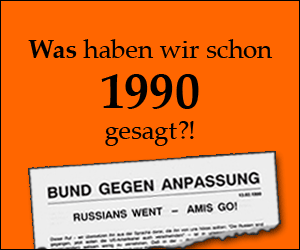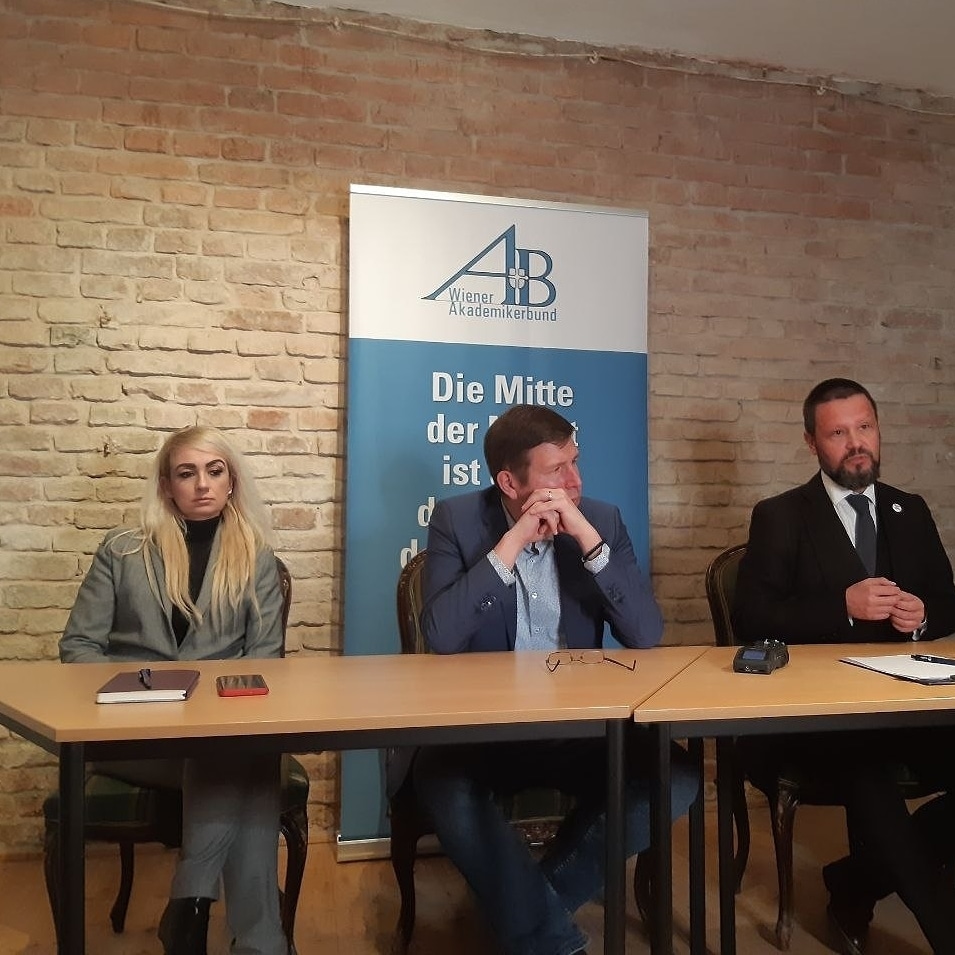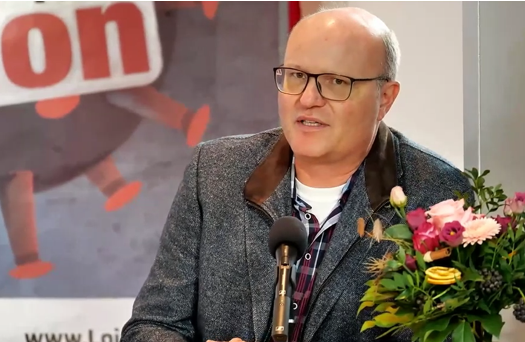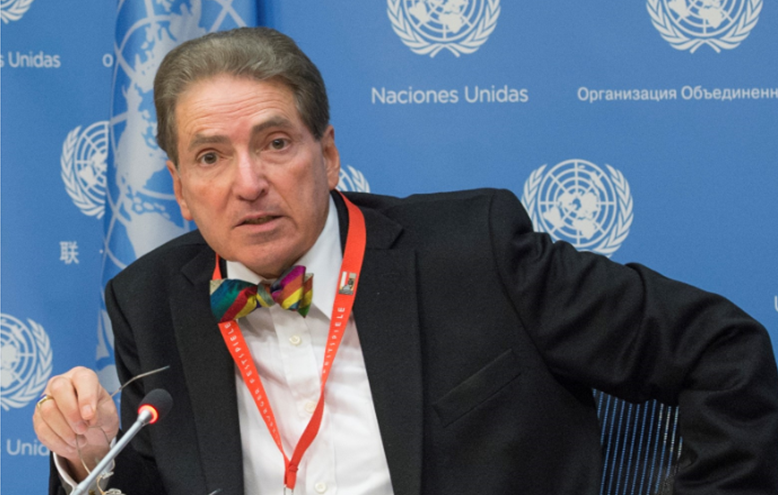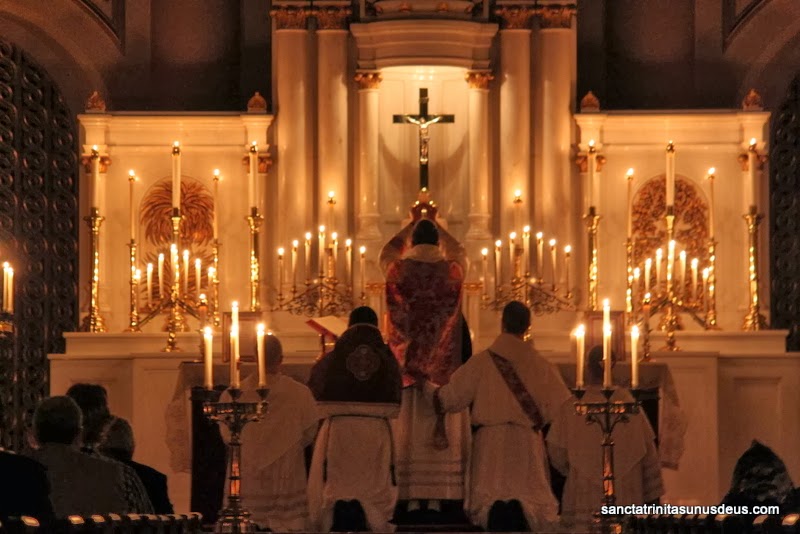There is a human right on peace
By ALFRED DE ZAYAS – As more and more politicians and scholars worldwide recognize that the Ukraine war cannot be solved militarily, that there will be no winners but only losers, we must concentrate on damage control, which means an immediate cease-fire. This is the only rational policy we can follow, and should be advanced by all United Nations agencies, notably the General Assembly, the UN High Commissioner for Human Rights, the UN High Commissioner for Refugees, the United Nations Development Program, the United Nations Environmental Program, the World Health Organization, etc. There is indeed a human right to peace, which all UN member states have an erga omnes obligation to respect. It is crucial for our survival that governments discard the outdated paradigm of unconditional surrender and “winner takes all”. The current war-mongering by politicians and the drums of war orchestrated by the mainstream media are anything but “patriotic”. In the nuclear age every measure must be taken to reduce tensions and build bridges for dialogue.
My blueprint for peace is simple.
- Ceasefire based on the UN Charter,
- A ban on deliveries of weapons to the belligerents,
- UN organized international assistance to all populations suffering because of the war, lack of energy, lack of food, etc.
- UN organized and monitored referenda in Crimea and Donbas,
- Lifting of sanctions that have nullified the benefits of globalization, broken supply chains, upset international trade, endangered food security,
- Drafting of a new security architecture for Europe and the world,
- Establishment of a Truth and Reconciliation Commission to hear the grievances from all sides, 8. Punishment of war crimes by the respective governments, e.g. Ukrainian crimes to be investigated and prosecuted by Ukrainian judges, Russian crimes to be investigated and punished by Russian tribunals.
The stakes are too high: The survival of the planet
There is no valid binary analysis or division of the world into “good guys” and “bad guys”. There has always been good in the bad and bad in the good. A binary analysis is only possible if one refuses to consider the opinions of all belligerents, and of the rest of humanity — as it watches this tragedy unfold. There are root causes of the catastrophe that we are witnessing, and if we want to formulate a viable blueprint for peace, we must not look at it exclusively from the “Western” perspective, but also take into account the views of 1.5 Billion Chinese, 1.5 Billion Indians, 240 million Pakistanis, 170 million Bangladeshis, 280 million Indonesians, 220 million Nigerians, 220 million Brazilians, 140 million Mexicans etc. The stakes are too high, and we Americans and Europeans have no right to risk the survival of the planet because of an internal European querelle. For the average African, Asian or Latin American, it is wholly irrelevant whether Crimea is in Russia or in Ukraine. A nuclear war must not be fought over this.
What is crucial is to agree NOW on a cease-fire and bring in mediators like Pope Francis to make concrete proposals. Former US Secretary of State Henry Kissinger has just published an essay in the Spectator, where he urges a negotiated end to hostilities and warns about the danger of a nuclear war. He mentioned that in 1916 the US government had the opportunity to end World War I through diplomacy, but that the much-revered Woodrow Wilson squandered the chance because of domestic politics.
The Ukraine “war in which two nuclear powers contest a conventionally armed country” is clearly a proxy war in which NATO countries are following a playbook to weaken Russia, in the vain expectation to induce regime change. The US and NATO have failed to understand that Russians are very patriotic, and that when they feel threatened, they will fight no matter what the odds. No level of sanctions will ever induce the Russian population to rebel against Putin and put a US-friendly Tsar in his place. We already have the experience of 62 years of draconian sanctions against Cuba, which have failed to bring the communist government to its knees. 40 years of sanctions against Nicaragua, 23 years of economic war against Venezuela have not taken the Chavez and Maduro governments down. In fact, to this day these left-wing governments enjoy considerable popular support. As I learned during my official UN mission to Venezuela, the vast majority of the Venezuelans do not blame Maduro for their troubles – they blame the U.S.
The proposals of Henry Kissinger
Of course, we cannot simply go back to the world before 24 February 2022. Too much blood has been shed. According to Kissinger any “peace process” would “link Ukraine to NATO, however expressed”, as he no longer sees Ukrainian neutrality as an option, which was the preferred solution when Turkey negotiated a peace agreement back in March 2022, which was torpedoed by the US and UK, who insisted in pursuing the war until “victory” against Russia, that is, misusing the Ukrainians as cannon fodder.
Kissinger proposes that Russia withdraw to the lines before 24 February, while the territories Ukraine claims – Donetsk, Lugansk and Crimea – could be the subject of a negotiation after a ceasefire. Personally, I have my doubts about this, because after the shelling of these territories by the Ukraine since 2014, a considerable level of hatred toward the Ukrainian authorities has emerged, so that it would be inconceivable for these territories to be reincorporated into Ukraine. It would then be a civil war, even a guerrilla war. Essentially it is a matter for the populations there to decide, pursuant to their verifiably determined wishes.
The right of self-determination of peoples (arts. 1, 55, Chapters XI and XII UN Charter) is solidly anchored in article 1 of the International Covenant on Civil and Political Rights, and both Ukraine and Russia must respect it. Of course, the UN could now organize self-determination referenda, which would be monitored internationally. But the UN failed the Ukrainian and Russian peoples, when it failed to organize and monitor referenda in these Russian-populated territories in 1991, when the Ukraine unilaterally split from the Soviet Union, or in 2014 following the anti-Russian coup d’état in Maidan, which overthrew the legitimate, democratically elected president of Ukraine, Victor Yanukovich. A referendum 2014 would have prevented the tragedy we are witnessing today.
By now it should be clear to everybody that, as the Kosovars will never consent to be reincorporated into Serbia, the Russian populations of Crimea, Donetsk and Lugansk would rebel against any such proposal. What is not clear is how the populations of Kherson and Zaporozhe would vote, territories where the Russian majority is less pronounced. Russia will never retreat to the 24 February 2022 line, because Russia considers with good reason that the people in these territories are in grave danger and that they are entitled to protection. Personally I do not adhere to the so-called doctrine of “Responsibility to Protect”[1]. But if R2P had any legitimacy, then the Russians could also invoke it.
In need of a new global security structure
A new European (or world-wide) security architecture should be built that would take into consideration the legitimate security concerns of all persons living in the area. The independence of Ukraine must of course be guaranteed, as indeed the independence of Russia.
There are many obstacles to peace in Ukraine, mostly attributable to the intransigent attitude of most NATO countries that to this day fail to acknowledge the fact that NATO’s eastern expansion, contrary to agreements made in 1989/91, was perceived by Russia as an existential threat and that sooner or later Russia would react. Let us not forget that from 2014 to 2022 Russia participated in the Minsk Accords, in OSCE meetings, in the Normandy Format. It must be recognized that Russia acted in conformity with article 2(3) of the UN Charter and spent 8 years trying to solve the problems created by the 2014 Maidan coup d’état by peaceful means. Alas, it was Ukraine, supported by the US and UK, who refused to implement the Minsk agreements and the right of self-determination of the Russian populations of Ukraine. The two treaties proposed by Foreign Minister Lavrov in December 2021 were moderate and a good basis for discussion. These treaties would have given Russia the national security guarantees it was entitled to have, and would have enabled a sustainable peace between Russia and Ukraine. Unfortunately, these proposals were arrogantly rejected by NATO Secretary General Jens Stoltenberg.
One problem is that many in the West imagine that “a Russia rendered impotent by war” would be desirable. These people do not know Russia, the Russian people of their history. They are prey to the anti-Russian propaganda that has always been present in the Western media, which abated a bit during the Gorbachev years late 1980s and early 1990s, but picked up quickly after NATO decided it needed an “enemy” to justify its existence. This happened under US President Bill Clinton, and we are seeing the consequences of rampant Russophobia today in the mainstream media, in talk shows, in Hollywood. This kind of xenophobia is prohibited in Article 20 of the International Covenant on Civil and Political rights, but most people do not know of the existence of ICCPR. I remember the anti-Russian agitation at the time of the Georgian invasion of South Ossetia, the hateful articles against Russian sportsmen and sportswomen during the Socci Winter Olympics early in 2014, just before the Maiden coup d’état. It is as if the media were already preparing the American and European public to hate Russians, so as to be able to better justify the putsch and the subsequent anti-Russian measures adopted by the putsch Parliament.
As a UN official, I had the opportunity to learn the Russian language and obtain my proficiency certificate. Ever since I have been grateful for the newly acquired ability to read Pushkin, Lermontov, Tolstoy, Dostoyevsky, Turgenev in the original. I also had the chance to use Russian at the Office of the UN High Commissioner for Human Rights during numerous missions to the Baltic states and Russia, and in 1994 during two missions to Ukraine to monitor both the parliamentary and presidential elections. I am happy to know a considerable number of Russians in Russia and in the diaspora, as well as Ukrainians in Ukraine and in the diaspora, some of whom I call friends. As a historian, I have made an effort to understand the Russian psyche, to put myself in their shoes. Kissinger reminds us of Russia’s “historical role” in Europe and warns that the chimera of “dismantling” Russia would turn its vast territory into a “contested vacuum” and endless wars by competing societies would follow. In the presence of thousands of nuclear weapons in the area, this would be a recipe for universal Apocalypse.
All sides committed war crimes
The mainstream media in the West continues to pour fuel on the fire by maximizing reports – whether verifiable or not – of alleged Russian war crimes. There is no doubt, that Russian soldiers have committed atrocities in Ukraine, as NATO forces have committed atrocities in Afghanistan, Iraq, Abu Ghraib, Guantanamo, and elsewhere. In my book The Wehrmacht War Crimes Bureau (University of Nebraska Press, 1980[2]) I documented atrocities committed by both Russian and Ukrainian soldiers on Yugoslavs, Poles, Hungarians, Germans, during World War II. Of course, Russians commit crimes. But all sides have committed them, and we should not be focusing on the primacy of punishment and war crimes trials, because experience shows that war crimes trials can only take place if there has been unconditional surrender by the vanquished, as 1945 when Germany and Japan capitulated.
Russia will react on a pre-emptive nuclear strike
The scenario today is quite different, because there is zero chance that Russia would ever surrender. If the escalation of tensions and the propaganda continue, there is a growing danger that someone at NATO will propose a “pre-emptive” nuclear strike against Russia, and if Russia were existentially threatened, it would throw its vast nuclear arsenal against us in the West. Let us not forget that the oceans are alive with NATO and Russian submarines all equipped with nuclear weapons. Thus, we should not provoke a nuclear confrontation that could very well terminate human (and animal) life on the planet.
Common sense tells us that we must reduce tensions and try to reach a compromise, a modus vivendi, even though it will take many years before relations between NATO countries and Russia can be restored to a respectful co-existence.
At the Nuremberg and Tokyo trails 1945-48 the vanquished were at the mercy of the victors (vae victis), and the Nuremberg and Tokyo trials were held in the arrogance of power. Surely many of those convicted were guilty of horrendous crimes. But a “victor’s tribunal” never has much legitimacy. In order to do “justice” a tribunal must punish all who have broken the law, and not focus on the vanquished and let the victors get away in total impunity. If the Nuremberg tribunal aspired to credibility, it should have tried the Soviets for their multiple massacres of religious minorities, the killing of 15,000 Polish prisoners of war at Katyn and elsewhere, it would have tried the US and UK for the deliberate terror bombing of population centres, killing an estimated 600,000 human beings. “Bomber Harris” certainly would have been hung. Also the “dambusters” would have had a place on the dock. If the Tokyo tribunal would have wanted historical respectability, it would have tried the US for its indiscriminate naval warfare, for its systematic machine-gunning of Japanese shipwrecked (as recorded in the UN Navy histories), would have tried British soldiers for killing Japanese prisoners of war in Southeast Asia (widely discussed in British Parliamentary Debates), would have tried the crew of the Enola Gay that threw the first atomic bomb on the hapless population of Hiroshima — historically one of the mega-crimes of the 20th century.
Do we need an international tribunal to try Putin, Zelinsky, Stoltenberg, to prosecute members of the Azov battalion, mercenaries and other ruthless combatants? No. Investigations and trials should be conducted only by the countries concerned. The Ukrainians have an interest in maintaining discipline in their armies. Ditto the Russians. An international tribunal would only politicize matters. All States parties to the 1949 Geneva Red Cross Conventions are already obliged to try their own criminals. Here is where emphasis must be placed.
With wisdom and serenity, we might manage to survive
What historical precedents do we have for major wars that have ended with amnesties[3]? Too many to count. Let me start with the Thirty Years War (1618-48) that wiped out some 8 million Europeans. Interestingly enough, notwithstanding the monstrous atrocities committed, no war crimes trials were held, no retribution was stipulated in the 1648 Treaties of Münster and Osnabrück. On the contrary, Article 2 of both treaties provides for a general amnesty. Too much blood had been spilt. Europe needed a rest, and “punishment” was left to God: “There shall be on the one side and the other a perpetual Oblivion, Amnesty, or Pardon of all that has been committed … in such a manner, that no body …shall practice any Acts of Hostility, entertain any Enmity, or cause any Trouble to each other.”[4] The Peace of Westphalia of 1648 has gone down in history as a milestone of international law and a reasonable effort at establishing a European security architecture[5].
We can also refer to article 3 of the Treaty of Rijswijk (1697), which ordained amnesty for the soldiers of the French and British monarchies. Article XI of the Final Act of the Congress of Vienna (1815) stipulated amnesties notwithstanding the atrocities of the Napoleonic wars. Chapter II of the Evian Accords of 1962, which ended the ferocious Algerian war of independence, similarly ordained an amnesty for both sides.
Admittedly, today’s world does not like the concept of “amnesty” and seems to be hooked on revenge. This is pretty dangerous, as we dance on the rim of the precipice.
With wisdom and serenity, we might manage to survive and someday say with Vergilius “forsan et haec olim meminisse iuvabit” … “perhaps one day it will be pleasing to remember these things”. Especially if our politicians exercise prudence and wisdom and succeed in saving the world from Armageddon. Sure enough, this sounds like an expression of stoicism and aestheticism, but what options do we have?
[1] See discussion of R2P in para. 32 of my 2018 report to the Human Rights Council. https://undocs.org/Home/Mobile?FinalSymbol=A%2FHRC%2F37%2F63&Language=E&DeviceType=Desktop&LangRequested=False
See the debate in the General Assembly on 23 July 2009, summarized in my 2012 report to the Assembly (A/67/277). Contrary to some trends and perceptions, the idea of the responsibility to protect, contained in General Assembly resolution 60/1 (2005 World Summit Outcome), did not replace the Charter-mandated international law of non-interference in the internal affairs of sovereign States. The responsibility to protect is not a lex specialis that derogates from Article 2 (3), (4) and (7) or any other provision of the Charter. The principle of non-intervention remains very much valid and is confirmed in countless resolutions of the Assembly and the Human Rights Council. Therefore, responsibility to protect cannot circumvent the Charter or engage in sabre-rattling or propaganda for war. At the plenary debate on the responsibility to protect, the President of the Assembly identified four benchmark questions that should determine whether and when the system of collective security could invoke the responsibility to protect: (a) Do the rules apply in principle, and is it likely that they will be applied in practice equally to all States, or, in the nature of things, is it more likely that the principle would be applied only by the strong against the weak? (b) Will the adoption of the responsibility to protect principle in the practice of collective security be more likely to enhance or undermine respect for international law? (c) Is the doctrine of responsibility to protect necessary and, conversely, does it guarantee that States will intervene to prevent another situation like the one that occurred in Rwanda? (d) Does the international community have the capacity to enforce accountability upon those who might abuse the right?
[2] See scholarly reviews on my website http://www.alfreddezayas.com/books.shtml
[3] Alfred de Zayas, “Amnesty Clause” in Rudolf Bernhardt (ed.) Encyclopedia of Public International Law, vol, I, North Holland, Amsterdam, 1992, pp. 148-151.
[4] https://avalon.law.yale.edu/17th_century/westphal.asp
[5] Alfred de Zayas, “Westphalia, Peace of” in Bernhardt, Encyclopedia of Public International Law, vol. IV, pp. 1465-1469, North Holland, Amsterdam,.2000.
 Bitte unterstützen Sie unseren Kampf für Freiheit und Bürgerrechte.
Bitte unterstützen Sie unseren Kampf für Freiheit und Bürgerrechte.
Für jede Spende (PayPal oder Banküberweisung) ab € 10.- erhalten Sie als Dankeschön auf Wunsch ein Dutzend Aufkleber „CORONA-DIKTATUR? NEIN DANKE“ portofrei und gratis! Details hier.

